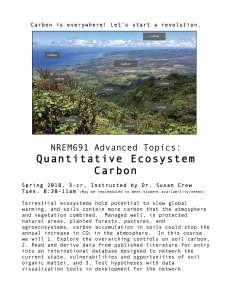NREM 304 L: Fundamentals of Soil Science Laboratory
(Fall annually, cross-listed with TPSS 304L and associated with NREM/TPSS 304)
Students gain an appreciation of the fascinating world of soils and see their critical role in sustaining life. Different soils behave and perform differently, in this class we cover how and why this is the case and apply understanding of soil processes to predict soil behavior and performance. Laboratory activities include field trips, greenhouse experiment, and lab-based analyses that together enable students to make environmentally and economically sound soil management decisions. Co-instructed with Prof. Jonathan Deenik (TPSS).
NREM 600: Foundations of Natural Resource and Environmental Management and Policy*
(Fall annually, part of a cohort-based core curriculum)
*Note: Effective natural resource and environmental management and policy require understanding the structure and behavior of complex social-ecological systems (SES), including the environmental and social components and their interactions. NREM 600 and 601 are part of a two-course core curriculum for NREM M.S. students. In this core curriculum, students will learn, integrate, and apply methods from both the natural and social sciences, ranging from interviews to participatory conceptual mapping to basic statistics and modeling. Research skills, ethics, and certification training will occur throughout the course to train students in critical aspects of proposal development and successful completion of research or projects involving social-ecological systems. Students may enter only as a cohort in Fall semester and follow through the year-long course together.
In NREM 600, students are provided with integrative concepts important for all resource managers, i.e., ecology, economics, hydrology, policy and management, human dimensions, and soils. The course also covers research and communication skills required for all resource management professionals, such as the scientific method, hypothesis testing, data compilation and analysis, and writing and presentation. The course instruction consists of topical instructor and guest lectures. Students will critique journal articles from distinct disciplinary literatures throughout the semester and write a research proposal for the NSF Graduate Research Fellowship Program. Co-instructed with Prof. Kirsten Oleson
NREM 601: Social-Ecological Systems Analysis of Natural Resource and Environmental Management
This course uses the case study teaching method to teach an integrative, interdisciplinary approach to natural resource and environmental management. Effective natural resource and environmental management and policy require understanding the structure and behavior of complex social-ecological systems (SES), including environmental and social components and their interactions.
Students will learn, integrate, and apply methods from both the natural and social sciences, ranging from interviews to participatory conceptual mapping to basic statistics and modeling. Research skills, ethics, and certification training is provided throughout the course as needed to train students in critical aspects of management plan development and successful completion of research or projects involving social-ecological systems.
The course instruction consists of topical instructor and stakeholder lectures and student-led learning activities. A field excursion will introduce the students to the physical location of the case study and introduce a community member’s perspective. Throughout the semester, students will work individually and collaboratively. In-classroom exercises will include interactive systems modeling, participatory mapping, data discovery, peer-to-peer learning around specific knowledge domains, team meetings, roundtable discussions of stakeholder interests, outside speakers, and guest lectures. Outside of the classroom, students will visit the case study watershed, in order to map their observations interactively in the next class session. They will interview stakeholders, attend community meetings, and partake in service-learning opportunities with community groups working to preserve the land and seascapes to inform their perspective for in-class roundtable discussions and debates. Many of the exercises are iterative, developing over time, and collaborative, requiring students to teach each other about independent knowledge domains that make up the parts if the system. Co-instructed with Prof. Kirsten Oleson.
 NREM 691: Advanced Topics in NREM – Quantitative Ecosystem Carbon
NREM 691: Advanced Topics in NREM – Quantitative Ecosystem Carbon
(Intermittent offering) – last taught Spring 2018
Students will 1) gain an understanding of the global carbon cycle particularly as it relates to human-influenced terrestrial ecosystems, 2) cultivate a quantitative perspective on carbon-related issues in their varied studies and interests, 3) gain practical experience in quantitative databases and data visualization, 4) expand and refine their professional quality research and communication skills, and 5) participate in responsible and effective collaboration. In past iterations of this course students worked to develop testable hypotheses and collect data from field or lab experiments. In the future, the course will focus more on basic knowledge of the controls on soil organic carbon accumulation and stabilization, vulnerability, and potential climate change mitigation. We will utilize published data to ingest information into an established database and data visualization tool to test hypotheses. NREM691 Quant Ecosystem Carbon -flier
My current favorite instructional resources (to help me do it better):
Harvard University’s ABLConnect and research on Active Learning.
A recent post on Tenure, She Wrote explaining why academics are poor teachers, so to help us try to improve. Many great links to other resources within the post.
Researchers with Vanderbilt University’s Center for Teaching have a new book “Understanding by Design” on a interesting backwards design approach for developing courses.